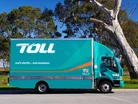How Toll's AU$67m Heavy Electric Fleet will Cut Emissions

Toll Group is accelerating its decarbonisation efforts with a AU$67m (US$43.8m) investment in battery electric heavy vehicles and charging infrastructure, aiming to cut emissions and lead Australia’s logistics industry towards a cleaner future.
Toll has been a leader in transport, shipping and supply chain solutions for more than 130 years, with in excess of 16,000 employees across 500 locations globally.
A subsidiary of Japan Post, Toll now operates in 150 countries and supports more than 20,000 clients.
Today, Toll is embarking on one of the largest corporate investments in EV technology for Australia’s heavy transport sector, as part of its commitment to sustainable logistics.
Rolling out electric heavy vehicles
The AU$67m (US$43.8m) investment includes plans for 28 battery electric heavy vehicles, along with the installation of at least 30 new charging points across eight customer sites and two Toll facilities.
The fleet expansion will include 10 Volvo FM electric prime movers and 18 Volvo FE electric rigid trucks, requiring an upfront capital investment of AU$20.3m (US$13.3m). This substantial investment supports Toll’s vision for reducing carbon emissions in the logistics sector.
Australian Renewable Energy Agency (ARENA) is contributing AU$9m (US$5.9m) through its Driving the Nation Programme, funding a considerable portion of the cost difference between electric and diesel vehicles.
This partnership highlights the commitment by both ARENA and Toll to decarbonise logistics, advancing Australia’s progress toward cleaner transportation.
Alan Beacham, Managing Director of Toll Group, emphasises the significance of this investment: “The funding from ARENA supports an important part of our broader strategy to optimise the environmental sustainability of our operations and we’re delighted to be supporting our customers through a shared commitment to decarbonising their supply chains without needing to rely solely on carbon offsets.”
Tackling emissions with key partners
The integration of Toll’s battery electric fleet will primarily serve third-party logistics operations for several major customers, including Coca-Cola Europacific Partners, Woolworths, Bluescope and Origin Energy.
Through this initiative, Toll will become Australia’s largest operator of battery electric heavy vehicles in the third-party logistics sector. The rollout is expected to begin in February of the coming year and is anticipated to reduce Toll’s overall fleet emissions by 1,810 tonnes of CO2 annually.
The move to battery EV is part of a larger effort to address emissions in the transport sector, which makes up around 20% of Australia’s total CO2 emissions.
ARENA CEO Darren Miller highlights the importance of this initiative: “Transport accounts for about one-fifth of Australia’s CO2 emissions, with heavy vehicles a significant share of the transport emissions pool, emphasising why ARENA is focusing in this area of greatest impact.”
Heavy-duty transport electrification is critical as demand for logistics and transport grows.
Developing infrastructure
The project also aims to test and provide valuable data on the practicalities of running a battery electric fleet in real-world logistics environments.
In addition to reducing emissions, Toll’s investment will provide critical information on the energy demands, charging requirements and operational logistics associated with battery electric heavy vehicles.
Route planning, payloads and duty cycles are just a few of the key operational factors that will be closely monitored.
Darren also points out that although the heavy vehicle market for battery electric technology has advanced significantly in recent years, there are still “significant hurdles including upfront costs for operators, challenges with charging technology and infrastructure, as well as the lack of real-world data.”
Toll’s findings will address these challenges, providing a useful model for other companies interested in electrification.
The company is also partnering with RMIT University to assess the outcomes of this project, with plans to produce a report that will share the insights gained from this large-scale fleet electrification.
The report will be made available to other logistics and transport companies, encouraging a more widespread transition to low-emission vehicles across the industry.
Our Australian fleet is undergoing a major transformation. While we’re committed to electrification, we’re also investing more than AU$200m (US$130.6m) to upgrade 25% of our fleet with more fuel-efficient vehicles, delivering emissions reductions of 5-10%.
Fully transitioning to electric isn’t feasible overnight, but by combining electrification with these more efficient models, we’re doing everything we can to reduce our environmental impact and support our customers.
As Australia’s logistics sector moves forward in its efforts to address emissions, Toll’s leadership on this front sets a clear example for sustainable growth in an increasingly carbon-conscious world.
Make sure you check out the latest edition of EV Magazine and also sign up to our global conference series - Sustainability LIVE 2025.
EV Magazine is a BizClik brand.


